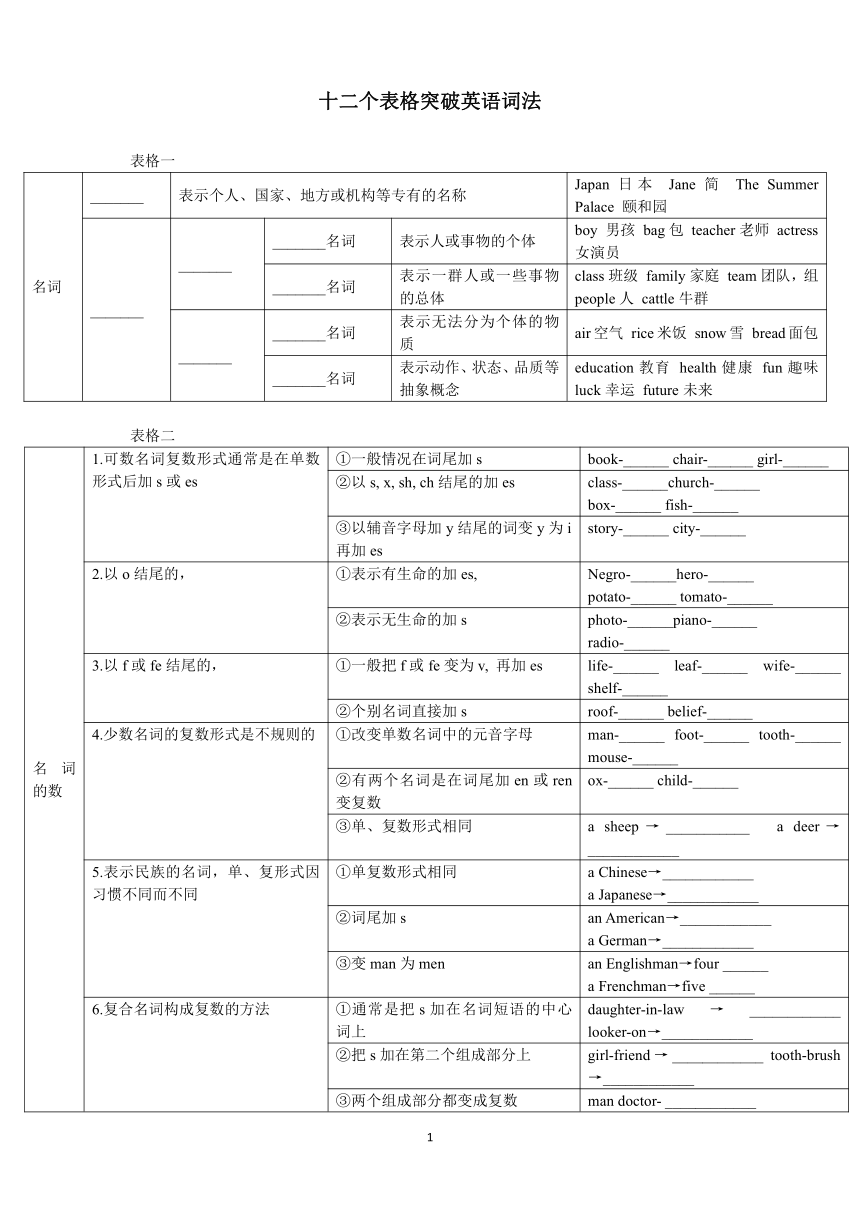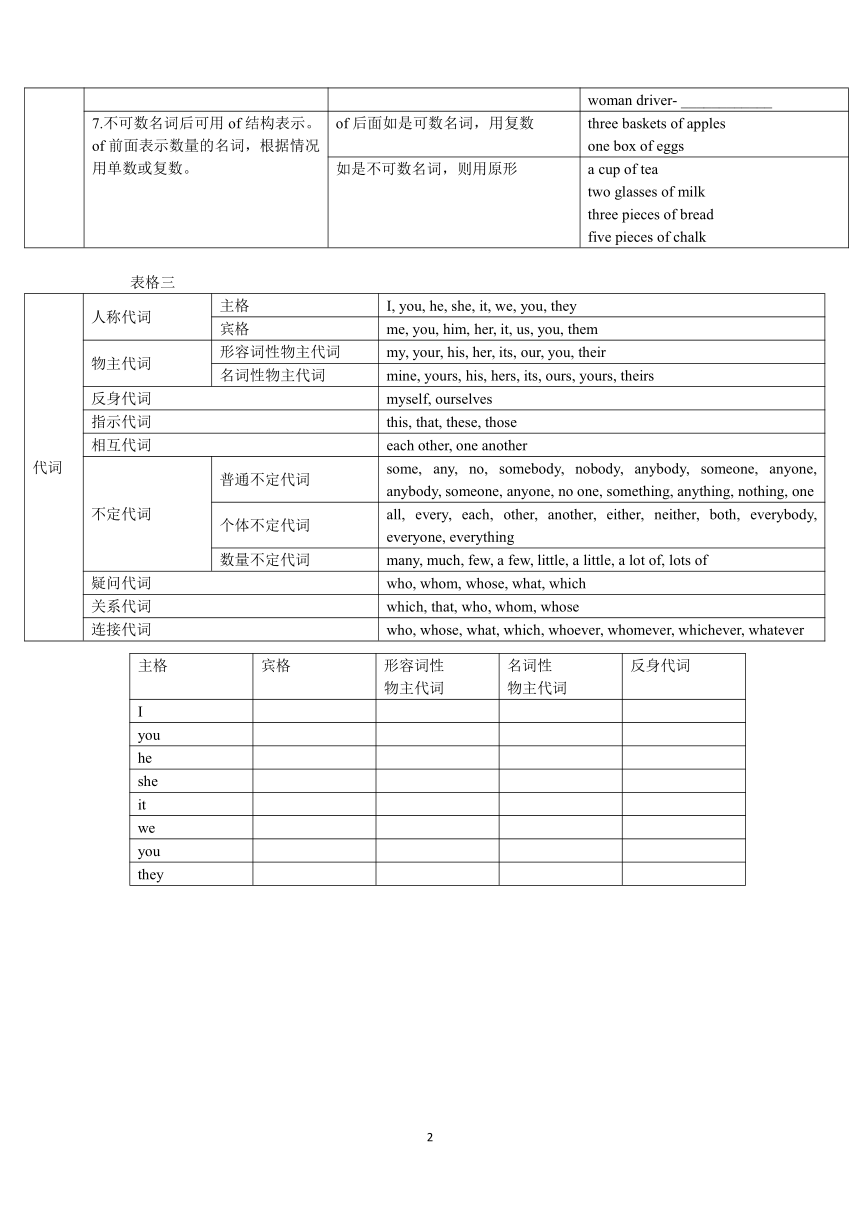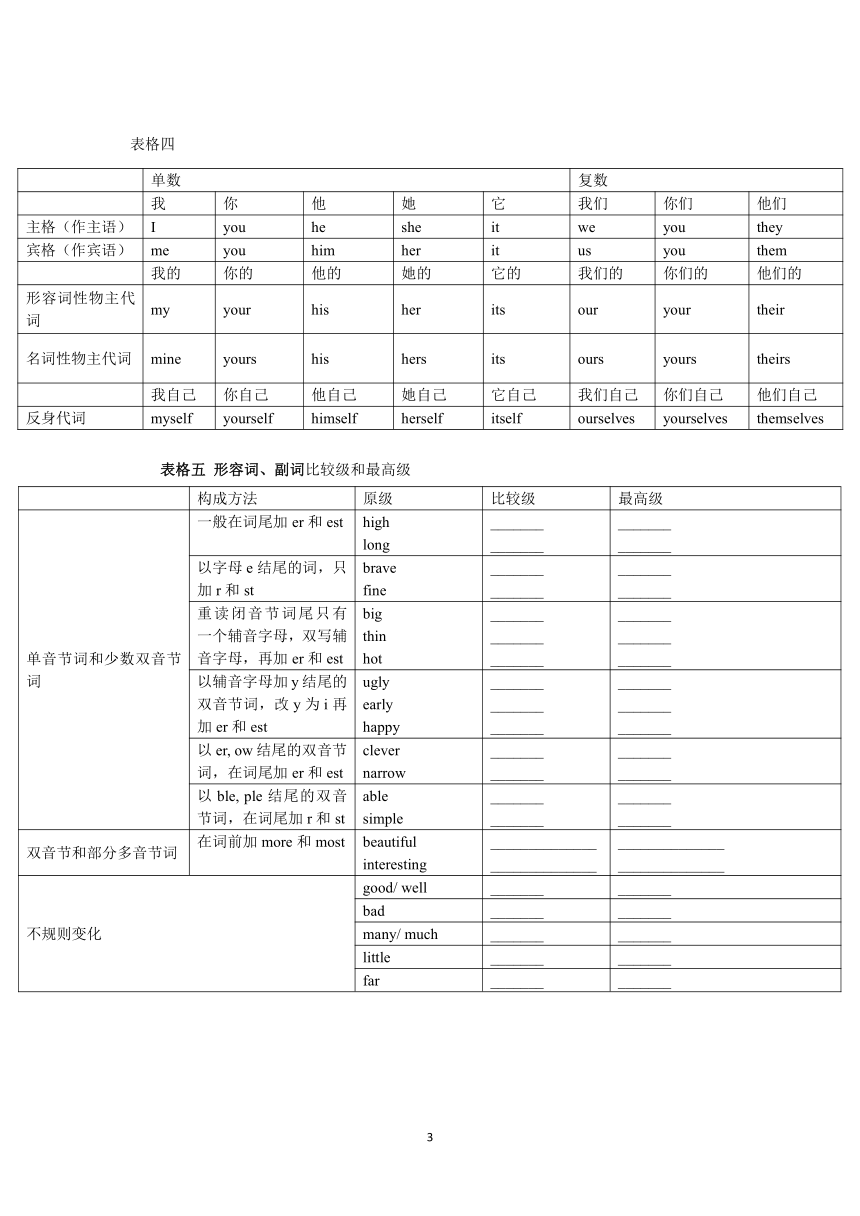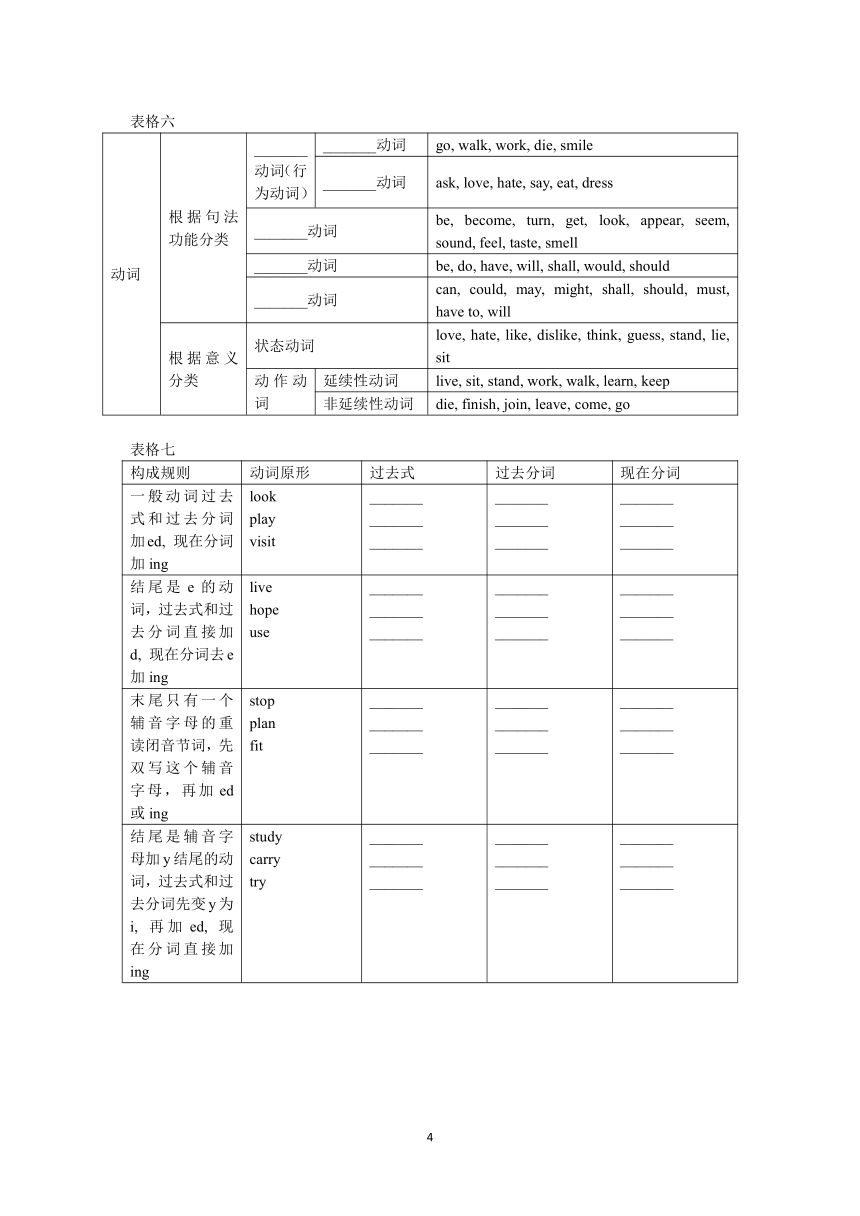2021-2022学年初升高英语语法之十二个表格突破词法学案(无答案)
文档属性
| 名称 | 2021-2022学年初升高英语语法之十二个表格突破词法学案(无答案) |  | |
| 格式 | zip | ||
| 文件大小 | 32.9KB | ||
| 资源类型 | 教案 | ||
| 版本资源 | 通用版 | ||
| 科目 | 英语 | ||
| 更新时间 | 2021-08-10 11:28:43 | ||
图片预览




文档简介
十二个表格突破英语词法
表格一
名词
_______
表示个人、国家、地方或机构等专有的名称
Japan日本
Jane简
The
Summer
Palace
颐和园
_______
_______
_______名词
表示人或事物的个体
boy
男孩
bag包
teacher老师
actress女演员
_______名词
表示一群人或一些事物的总体
class班级
family家庭
team团队,组
people人
cattle牛群
_______
_______名词
表示无法分为个体的物质
air空气
rice米饭
snow雪
bread面包
_______名词
表示动作、状态、品质等抽象概念
education教育
health健康
fun趣味
luck幸运
future未来
表格二
名词的数
1.可数名词复数形式通常是在单数形式后加s或es
①一般情况在词尾加s
book-______
chair-______
girl-______
②以s,
x,
sh,
ch结尾的加es
class-______church-______
box-______
fish-______
③以辅音字母加y结尾的词变y为i再加es
story-______
city-______
2.以o结尾的,
①表示有生命的加es,
Negro-______hero-______
potato-______
tomato-______
②表示无生命的加s
photo-______piano-______
radio-______
3.以f或fe结尾的,
①一般把f或fe变为v,
再加es
life-______
leaf-______
wife-______
shelf-______
②个别名词直接加s
roof-______
belief-______
4.少数名词的复数形式是不规则的
①改变单数名词中的元音字母
man-______
foot-______
tooth-______
mouse-______
②有两个名词是在词尾加en或ren变复数
ox-______
child-______
③单、复数形式相同
a
sheep→___________
a
deer→____________
5.表示民族的名词,单、复形式因习惯不同而不同
①单复数形式相同
a
Chinese→____________
a
Japanese→____________
②词尾加s
an
American→____________
a
German→____________
③变man为men
an
Englishman→four
______
a
Frenchman→five
______
6.复合名词构成复数的方法
①通常是把s加在名词短语的中心词上
daughter-in-law→____________
looker-on→____________
②把s加在第二个组成部分上
girl-friend→____________
tooth-brush→____________
③两个组成部分都变成复数
man
doctor-
____________
woman
driver-
____________
7.不可数名词后可用of结构表示。of前面表示数量的名词,根据情况用单数或复数。
of后面如是可数名词,用复数
three
baskets
of
apples
one
box
of
eggs
如是不可数名词,则用原形
a
cup
of
tea
two
glasses
of
milk
three
pieces
of
bread
five
pieces
of
chalk
表格三
代词
人称代词
主格
I,
you,
he,
she,
it,
we,
you,
they
宾格
me,
you,
him,
her,
it,
us,
you,
them
物主代词
形容词性物主代词
my,
your,
his,
her,
its,
our,
you,
their
名词性物主代词
mine,
yours,
his,
hers,
its,
ours,
yours,
theirs
反身代词
myself,
ourselves
指示代词
this,
that,
these,
those
相互代词
each
other,
one
another
不定代词
普通不定代词
some,
any,
no,
somebody,
nobody,
anybody,
someone,
anyone,
anybody,
someone,
anyone,
no
one,
something,
anything,
nothing,
one
个体不定代词
all,
every,
each,
other,
another,
either,
neither,
both,
everybody,
everyone,
everything
数量不定代词
many,
much,
few,
a
few,
little,
a
little,
a
lot
of,
lots
of
疑问代词
who,
whom,
whose,
what,
which
关系代词
which,
that,
who,
whom,
whose
连接代词
who,
whose,
what,
which,
whoever,
whomever,
whichever,
whatever
主格
宾格
形容词性
物主代词
名词性
物主代词
反身代词
I
you
he
she
it
we
you
they
单数
复数
我
你
他
她
它
我们
你们
他们
主格(作主语)
I
you
he
she
it
we
you
they
宾格(作宾语)
me
you
him
her
it
us
you
them
我的
你的
他的
她的
它的
我们的
你们的
他们的
形容词性物主代词
my
your
his
her
its
our
your
their
名词性物主代词
mine
yours
his
hers
its
ours
yours
theirs
我自己
你自己
他自己
她自己
它自己
我们自己
你们自己
他们自己
反身代词
myself
yourself
himself
herself
itself
ourselves
yourselves
themselves
表格四
表格五
形容词、副词比较级和最高级
构成方法
原级
比较级
最高级
单音节词和少数双音节词
一般在词尾加er和est
high
long
_______
_______
_______
_______
以字母e结尾的词,只加r和st
brave
fine
_______
_______
_______
_______
重读闭音节词尾只有一个辅音字母,双写辅音字母,再加er和est
big
thin
hot
_______
_______
_______
_______
_______
_______
以辅音字母加y结尾的双音节词,改y为i再加er和est
ugly
early
happy
_______
_______
_______
_______
_______
_______
以er,
ow结尾的双音节词,在词尾加er和est
clever
narrow
_______
_______
_______
_______
以ble,
ple结尾的双音节词,在词尾加r和st
able
simple
_______
_______
_______
_______
双音节和部分多音节词
在词前加more和most
beautiful
interesting
______________
______________
______________
______________
不规则变化
good/
well
_______
_______
bad
_______
_______
many/
much
_______
_______
little
_______
_______
far
_______
_______
表格六
动词
根据句法功能分类
_______动词(行为动词)
_______动词
go,
walk,
work,
die,
smile
_______动词
ask,
love,
hate,
say,
eat,
dress
_______动词
be,
become,
turn,
get,
look,
appear,
seem,
sound,
feel,
taste,
smell
_______动词
be,
do,
have,
will,
shall,
would,
should
_______动词
can,
could,
may,
might,
shall,
should,
must,
have
to,
will
根据意义分类
状态动词
love,
hate,
like,
dislike,
think,
guess,
stand,
lie,
sit
动作动词
延续性动词
live,
sit,
stand,
work,
walk,
learn,
keep
非延续性动词
die,
finish,
join,
leave,
come,
go
表格七
构成规则
动词原形
过去式
过去分词
现在分词
一般动词过去式和过去分词加ed,
现在分词加ing
look
play
visit
_______
_______
_______
_______
_______
_______
_______
_______
_______
结尾是e的动词,过去式和过去分词直接加d,
现在分词去e加ing
live
hope
use
_______
_______
_______
_______
_______
_______
_______
_______
_______
末尾只有一个辅音字母的重读闭音节词,先双写这个辅音字母,再加ed或ing
stop
plan
fit
_______
_______
_______
_______
_______
_______
_______
_______
_______
结尾是辅音字母加y结尾的动词,过去式和过去分词先变y为i,
再加ed,
现在分词直接加ing
study
carry
try
_______
_______
_______
_______
_______
_______
_______
_______
_______
表格八
现在式
过去式
过去分词
特点
begin
do
give
_______
_______
_______
_______
_______
_______
三种不同,改变词中元音
dig
find
sit
_______
_______
_______
_______
_______
_______
两种相同,改变元音
build
bend
send
spend
_______
_______
_______
_______
_______
_______
_______
_______
两种相同,改变词尾
burn
mean
_______
_______
_______
_______
两种相同,词尾加t
feel
keep
leave
_______
_______
_______
_______
_______
_______
两种相同,改变元音,词尾加t
cut
put
shut
_______
_______
_______
_______
_______
_______
三种相同
表格九
以do为例时态的构成
时
态
一般
进行
完成
现在
do/
does
is/
am/
are
doing
have/
has
done
过去
did
was/
were
doing
had
done
将来
will
do
will
be
doing
will
have
done
表格十
以do为例时态的被动语态的构成
时
态
一般
进行
完成
现在
is/
am/
are
done
is/
am/
are
being
done
have/
has
been
done
过去
was/
were
done
was/
were
being
done
had
been
done
将来
will
be
done
will
be
done
will
have
been
done
表格十一
各时态对应的时间状语
时态种类
主动结构
被动结构
常见时间状语和句型
一般现在时
do/does
is/
am/
are
done
never,
seldom,
sometimes,
often,
usually,
always,
every
day,
on
weekends,
on
Mondays,
once
a
week等.
一般过去时
did
was/
were
done
yesterday,
last
year,
in
1996,
ago,
the
other
day,
just
now等
现在进行时
is/am/are
doing
is/am/are
being
done
now,
at
this
time
过去进行时
was/were
doing
was/were
being
done
at
that
time
现在完成时
have/has
done
have/has
been
done
recently,
lately,
in
recent
days,
so
far,
up
to
now,
until
now,
since,
yet,
ever,
never,
already,
these
days,
for
a
long
time,
介词+时间段
for/
in/
over/
during
the
last/past
few
years,
by
the
end
of
+现在或将来的时间,This
/It
is
+
the
+序数词+time
+that
…
过去完成时
had
done
had
been
done
by
the
end
of
+
过去的时间
This
/It
was
+
the
+序数词+time
+that
…
Hardly/
Scarcely
…when
…,
No
sooner…
than…
一般将来时
will/shall
do
will/shall
be
done
tomorrow,
next
week,
in
two
days,
soon
过去将来时
would
do
would
be
done
现在完成进行时
has/have
been
doing
\
for
a
long
time,
these
days
将来进行时
will
be
doing
will
be
done
at
that
time
tomorrow
表格十二
并列连词
and,
but,
or,
so,
for
并列、递进或顺承关系
and,
both...and...,
neither...nor...,
not
only...but
also...,
as
well
as
转折、对比关系
but,
yet;
while
选择关系
or,
either...or...,
not...but...
因果关系
so,
for
从属连词
that,
which,
when,
where
定从引导词
关系代词
that,
which,
who,
whom,
whose,
as
关系副词
when,
where,
why
名从引导词
从属连词
that,
whether,
if
连接代词
what,
who,
whom,
which,
whose,
whatever,
whoever,
whomever,
whichever
连接副词
where,
when,
why,
how,
wherever,
whenever
状从引导词
①时间状从
when,
while,
as,
before,
after,
till,
until,
since,
as
soon
as,
immediately,
instantly,
directly,
the
moment,
the
minute,
hardly...when...,
no
sooner...than...
②地点状从
where,
wherever
③条件状从
if,
unless(=if
not),
so/
as
long
as,
on
condition
that,
in
case,
suppose/
supposing,
provided/
providing
④原因状从
because,
for,
as,
since,
now
that,
considering
that
⑤目的状从
so
that,
in
order
that,
in
case,
for
fear
that
⑥结果状从
so
that,
so/
such...that...
⑦方式状从
as,
as
if/
though
⑧比较状从
than,
as...as...,
not
as/
so...as...
⑨让步状从
although,
though,
even
if/
though,
as,
while,
what/who/when/where/however
【代词】
1.
This
is
the
only
shirt
we
have
now.
If
you
don’t
want
to
take
_______
,
you
may
come
and
have
a
look
round
tomorrow.
A.
another
B.
any
C.
it
D.
one
-Is
your
camera
like
Bill’s
or
Ann’s?
-No,
but
it’s
almost
the
same
as
______
.
?
A.
theirs
B.
yours
C.
mine
D.
hers
3.
The
bike
is
not
Mary’s.
_____
is
red.
?
A.
Hers
B.
Her
C.
His
D.
He
4.
I
thought
the
film
was
pretty
good,
but
my
brother
didn’t
think
______.
?
A.
yes
B.
too
C.
really
D.
so
-Have
you
got
a
camera?
-No.
In
fact
I
should
buy
______.
?
A.
it
B.
one
C.
some
D.
that?
6.
Anna
is
very
thoughtful.
She
always
thinks
about
______
other
people
want.
?
A.
how
B.
when
C.
where
D.
what?
7.
The
police
questions
all
the
students,
but
_______of
them
had
seen
the
thief.
A.
none
B.
neither
C.
either
D.
any
They
had
two
daughters,
one
a
baby,
and
______
a
girl
of
12.
?
A.
other
B.
the
other
C.
one
other
D.
another
9.
Some
people
refer
eating
vegetable,
while
_____
prefer
eating
meat.
?
A.
the
other
B.
the
others
C.others
D.
another
10.
Presidents
are
no
different
from
______
else,
they
are
human
beings.
?
A.
anybody
B.
somebody
C.
nobody
D.
everybody
-Is
there
anything
wrong
with
your
stomach?
-
______.
?
A.
Nothing
serious
B.
Be
careful
C.
Don’t
mind
D.
Keep
calm?
12.
I
knew
______
about
the
accident
except
what
I
read
in
the
news
paper.
?
A.
something
B.
everything
C.
anything
D.
nothing?
【冠词】
1.
Education
is
_______
lifelong
experience
that
starts
long
before
______
start
of
school.
A.
the;
the
B.
the;
a
C.
a;
a
D.
a;
the
2.Nearly
all
of
______
young
people
interviewed
believed
that
hard
work
was
______
key
to
success.
?
A.
/;
the
B.
/;
a
C.
a;
/
D.
the;
the
3.
-Mr
Smith,
can
I
use______
department’s
car?
-Sure,
if
you
can
find
______
the.
It
has
been
missing
for
three
days.
?
A.
the;
/
B.
/;
the
C.
the;
the
D.
the;
a
4.
I
managed
to
make
myself
understood
with
______
help
of
______
phrase
book.
?
A.
/;
a
B.
a;
the
C.
the;
a
D.
by;
/
5.The
man
I
was
talking
to
on
______
bus
was
______
friend
of
mine.
/;
the
B.
a;
the
C.
the;
a
D.
/;
a?
6.
The
Chinese
New
Year
is
______
excellent
time
to
be
with
your
family
and
have
______
fun.
?
A.
/;
the
B.
an;
/
C.
the;
a
D.
an;
the?
7.
No
matter
where
they
are,
my
parents
go
to
_______every
Sunday
morning.
A.
church
B.
the
church
C.
a
church
D.
churches
表格一
名词
_______
表示个人、国家、地方或机构等专有的名称
Japan日本
Jane简
The
Summer
Palace
颐和园
_______
_______
_______名词
表示人或事物的个体
boy
男孩
bag包
teacher老师
actress女演员
_______名词
表示一群人或一些事物的总体
class班级
family家庭
team团队,组
people人
cattle牛群
_______
_______名词
表示无法分为个体的物质
air空气
rice米饭
snow雪
bread面包
_______名词
表示动作、状态、品质等抽象概念
education教育
health健康
fun趣味
luck幸运
future未来
表格二
名词的数
1.可数名词复数形式通常是在单数形式后加s或es
①一般情况在词尾加s
book-______
chair-______
girl-______
②以s,
x,
sh,
ch结尾的加es
class-______church-______
box-______
fish-______
③以辅音字母加y结尾的词变y为i再加es
story-______
city-______
2.以o结尾的,
①表示有生命的加es,
Negro-______hero-______
potato-______
tomato-______
②表示无生命的加s
photo-______piano-______
radio-______
3.以f或fe结尾的,
①一般把f或fe变为v,
再加es
life-______
leaf-______
wife-______
shelf-______
②个别名词直接加s
roof-______
belief-______
4.少数名词的复数形式是不规则的
①改变单数名词中的元音字母
man-______
foot-______
tooth-______
mouse-______
②有两个名词是在词尾加en或ren变复数
ox-______
child-______
③单、复数形式相同
a
sheep→___________
a
deer→____________
5.表示民族的名词,单、复形式因习惯不同而不同
①单复数形式相同
a
Chinese→____________
a
Japanese→____________
②词尾加s
an
American→____________
a
German→____________
③变man为men
an
Englishman→four
______
a
Frenchman→five
______
6.复合名词构成复数的方法
①通常是把s加在名词短语的中心词上
daughter-in-law→____________
looker-on→____________
②把s加在第二个组成部分上
girl-friend→____________
tooth-brush→____________
③两个组成部分都变成复数
man
doctor-
____________
woman
driver-
____________
7.不可数名词后可用of结构表示。of前面表示数量的名词,根据情况用单数或复数。
of后面如是可数名词,用复数
three
baskets
of
apples
one
box
of
eggs
如是不可数名词,则用原形
a
cup
of
tea
two
glasses
of
milk
three
pieces
of
bread
five
pieces
of
chalk
表格三
代词
人称代词
主格
I,
you,
he,
she,
it,
we,
you,
they
宾格
me,
you,
him,
her,
it,
us,
you,
them
物主代词
形容词性物主代词
my,
your,
his,
her,
its,
our,
you,
their
名词性物主代词
mine,
yours,
his,
hers,
its,
ours,
yours,
theirs
反身代词
myself,
ourselves
指示代词
this,
that,
these,
those
相互代词
each
other,
one
another
不定代词
普通不定代词
some,
any,
no,
somebody,
nobody,
anybody,
someone,
anyone,
anybody,
someone,
anyone,
no
one,
something,
anything,
nothing,
one
个体不定代词
all,
every,
each,
other,
another,
either,
neither,
both,
everybody,
everyone,
everything
数量不定代词
many,
much,
few,
a
few,
little,
a
little,
a
lot
of,
lots
of
疑问代词
who,
whom,
whose,
what,
which
关系代词
which,
that,
who,
whom,
whose
连接代词
who,
whose,
what,
which,
whoever,
whomever,
whichever,
whatever
主格
宾格
形容词性
物主代词
名词性
物主代词
反身代词
I
you
he
she
it
we
you
they
单数
复数
我
你
他
她
它
我们
你们
他们
主格(作主语)
I
you
he
she
it
we
you
they
宾格(作宾语)
me
you
him
her
it
us
you
them
我的
你的
他的
她的
它的
我们的
你们的
他们的
形容词性物主代词
my
your
his
her
its
our
your
their
名词性物主代词
mine
yours
his
hers
its
ours
yours
theirs
我自己
你自己
他自己
她自己
它自己
我们自己
你们自己
他们自己
反身代词
myself
yourself
himself
herself
itself
ourselves
yourselves
themselves
表格四
表格五
形容词、副词比较级和最高级
构成方法
原级
比较级
最高级
单音节词和少数双音节词
一般在词尾加er和est
high
long
_______
_______
_______
_______
以字母e结尾的词,只加r和st
brave
fine
_______
_______
_______
_______
重读闭音节词尾只有一个辅音字母,双写辅音字母,再加er和est
big
thin
hot
_______
_______
_______
_______
_______
_______
以辅音字母加y结尾的双音节词,改y为i再加er和est
ugly
early
happy
_______
_______
_______
_______
_______
_______
以er,
ow结尾的双音节词,在词尾加er和est
clever
narrow
_______
_______
_______
_______
以ble,
ple结尾的双音节词,在词尾加r和st
able
simple
_______
_______
_______
_______
双音节和部分多音节词
在词前加more和most
beautiful
interesting
______________
______________
______________
______________
不规则变化
good/
well
_______
_______
bad
_______
_______
many/
much
_______
_______
little
_______
_______
far
_______
_______
表格六
动词
根据句法功能分类
_______动词(行为动词)
_______动词
go,
walk,
work,
die,
smile
_______动词
ask,
love,
hate,
say,
eat,
dress
_______动词
be,
become,
turn,
get,
look,
appear,
seem,
sound,
feel,
taste,
smell
_______动词
be,
do,
have,
will,
shall,
would,
should
_______动词
can,
could,
may,
might,
shall,
should,
must,
have
to,
will
根据意义分类
状态动词
love,
hate,
like,
dislike,
think,
guess,
stand,
lie,
sit
动作动词
延续性动词
live,
sit,
stand,
work,
walk,
learn,
keep
非延续性动词
die,
finish,
join,
leave,
come,
go
表格七
构成规则
动词原形
过去式
过去分词
现在分词
一般动词过去式和过去分词加ed,
现在分词加ing
look
play
visit
_______
_______
_______
_______
_______
_______
_______
_______
_______
结尾是e的动词,过去式和过去分词直接加d,
现在分词去e加ing
live
hope
use
_______
_______
_______
_______
_______
_______
_______
_______
_______
末尾只有一个辅音字母的重读闭音节词,先双写这个辅音字母,再加ed或ing
stop
plan
fit
_______
_______
_______
_______
_______
_______
_______
_______
_______
结尾是辅音字母加y结尾的动词,过去式和过去分词先变y为i,
再加ed,
现在分词直接加ing
study
carry
try
_______
_______
_______
_______
_______
_______
_______
_______
_______
表格八
现在式
过去式
过去分词
特点
begin
do
give
_______
_______
_______
_______
_______
_______
三种不同,改变词中元音
dig
find
sit
_______
_______
_______
_______
_______
_______
两种相同,改变元音
build
bend
send
spend
_______
_______
_______
_______
_______
_______
_______
_______
两种相同,改变词尾
burn
mean
_______
_______
_______
_______
两种相同,词尾加t
feel
keep
leave
_______
_______
_______
_______
_______
_______
两种相同,改变元音,词尾加t
cut
put
shut
_______
_______
_______
_______
_______
_______
三种相同
表格九
以do为例时态的构成
时
态
一般
进行
完成
现在
do/
does
is/
am/
are
doing
have/
has
done
过去
did
was/
were
doing
had
done
将来
will
do
will
be
doing
will
have
done
表格十
以do为例时态的被动语态的构成
时
态
一般
进行
完成
现在
is/
am/
are
done
is/
am/
are
being
done
have/
has
been
done
过去
was/
were
done
was/
were
being
done
had
been
done
将来
will
be
done
will
be
done
will
have
been
done
表格十一
各时态对应的时间状语
时态种类
主动结构
被动结构
常见时间状语和句型
一般现在时
do/does
is/
am/
are
done
never,
seldom,
sometimes,
often,
usually,
always,
every
day,
on
weekends,
on
Mondays,
once
a
week等.
一般过去时
did
was/
were
done
yesterday,
last
year,
in
1996,
ago,
the
other
day,
just
now等
现在进行时
is/am/are
doing
is/am/are
being
done
now,
at
this
time
过去进行时
was/were
doing
was/were
being
done
at
that
time
现在完成时
have/has
done
have/has
been
done
recently,
lately,
in
recent
days,
so
far,
up
to
now,
until
now,
since,
yet,
ever,
never,
already,
these
days,
for
a
long
time,
介词+时间段
for/
in/
over/
during
the
last/past
few
years,
by
the
end
of
+现在或将来的时间,This
/It
is
+
the
+序数词+time
+that
…
过去完成时
had
done
had
been
done
by
the
end
of
+
过去的时间
This
/It
was
+
the
+序数词+time
+that
…
Hardly/
Scarcely
…when
…,
No
sooner…
than…
一般将来时
will/shall
do
will/shall
be
done
tomorrow,
next
week,
in
two
days,
soon
过去将来时
would
do
would
be
done
现在完成进行时
has/have
been
doing
\
for
a
long
time,
these
days
将来进行时
will
be
doing
will
be
done
at
that
time
tomorrow
表格十二
并列连词
and,
but,
or,
so,
for
并列、递进或顺承关系
and,
both...and...,
neither...nor...,
not
only...but
also...,
as
well
as
转折、对比关系
but,
yet;
while
选择关系
or,
either...or...,
not...but...
因果关系
so,
for
从属连词
that,
which,
when,
where
定从引导词
关系代词
that,
which,
who,
whom,
whose,
as
关系副词
when,
where,
why
名从引导词
从属连词
that,
whether,
if
连接代词
what,
who,
whom,
which,
whose,
whatever,
whoever,
whomever,
whichever
连接副词
where,
when,
why,
how,
wherever,
whenever
状从引导词
①时间状从
when,
while,
as,
before,
after,
till,
until,
since,
as
soon
as,
immediately,
instantly,
directly,
the
moment,
the
minute,
hardly...when...,
no
sooner...than...
②地点状从
where,
wherever
③条件状从
if,
unless(=if
not),
so/
as
long
as,
on
condition
that,
in
case,
suppose/
supposing,
provided/
providing
④原因状从
because,
for,
as,
since,
now
that,
considering
that
⑤目的状从
so
that,
in
order
that,
in
case,
for
fear
that
⑥结果状从
so
that,
so/
such...that...
⑦方式状从
as,
as
if/
though
⑧比较状从
than,
as...as...,
not
as/
so...as...
⑨让步状从
although,
though,
even
if/
though,
as,
while,
what/who/when/where/however
【代词】
1.
This
is
the
only
shirt
we
have
now.
If
you
don’t
want
to
take
_______
,
you
may
come
and
have
a
look
round
tomorrow.
A.
another
B.
any
C.
it
D.
one
-Is
your
camera
like
Bill’s
or
Ann’s?
-No,
but
it’s
almost
the
same
as
______
.
?
A.
theirs
B.
yours
C.
mine
D.
hers
3.
The
bike
is
not
Mary’s.
_____
is
red.
?
A.
Hers
B.
Her
C.
His
D.
He
4.
I
thought
the
film
was
pretty
good,
but
my
brother
didn’t
think
______.
?
A.
yes
B.
too
C.
really
D.
so
-Have
you
got
a
camera?
-No.
In
fact
I
should
buy
______.
?
A.
it
B.
one
C.
some
D.
that?
6.
Anna
is
very
thoughtful.
She
always
thinks
about
______
other
people
want.
?
A.
how
B.
when
C.
where
D.
what?
7.
The
police
questions
all
the
students,
but
_______of
them
had
seen
the
thief.
A.
none
B.
neither
C.
either
D.
any
They
had
two
daughters,
one
a
baby,
and
______
a
girl
of
12.
?
A.
other
B.
the
other
C.
one
other
D.
another
9.
Some
people
refer
eating
vegetable,
while
_____
prefer
eating
meat.
?
A.
the
other
B.
the
others
C.others
D.
another
10.
Presidents
are
no
different
from
______
else,
they
are
human
beings.
?
A.
anybody
B.
somebody
C.
nobody
D.
everybody
-Is
there
anything
wrong
with
your
stomach?
-
______.
?
A.
Nothing
serious
B.
Be
careful
C.
Don’t
mind
D.
Keep
calm?
12.
I
knew
______
about
the
accident
except
what
I
read
in
the
news
paper.
?
A.
something
B.
everything
C.
anything
D.
nothing?
【冠词】
1.
Education
is
_______
lifelong
experience
that
starts
long
before
______
start
of
school.
A.
the;
the
B.
the;
a
C.
a;
a
D.
a;
the
2.Nearly
all
of
______
young
people
interviewed
believed
that
hard
work
was
______
key
to
success.
?
A.
/;
the
B.
/;
a
C.
a;
/
D.
the;
the
3.
-Mr
Smith,
can
I
use______
department’s
car?
-Sure,
if
you
can
find
______
the.
It
has
been
missing
for
three
days.
?
A.
the;
/
B.
/;
the
C.
the;
the
D.
the;
a
4.
I
managed
to
make
myself
understood
with
______
help
of
______
phrase
book.
?
A.
/;
a
B.
a;
the
C.
the;
a
D.
by;
/
5.The
man
I
was
talking
to
on
______
bus
was
______
friend
of
mine.
/;
the
B.
a;
the
C.
the;
a
D.
/;
a?
6.
The
Chinese
New
Year
is
______
excellent
time
to
be
with
your
family
and
have
______
fun.
?
A.
/;
the
B.
an;
/
C.
the;
a
D.
an;
the?
7.
No
matter
where
they
are,
my
parents
go
to
_______every
Sunday
morning.
A.
church
B.
the
church
C.
a
church
D.
churches
同课章节目录
